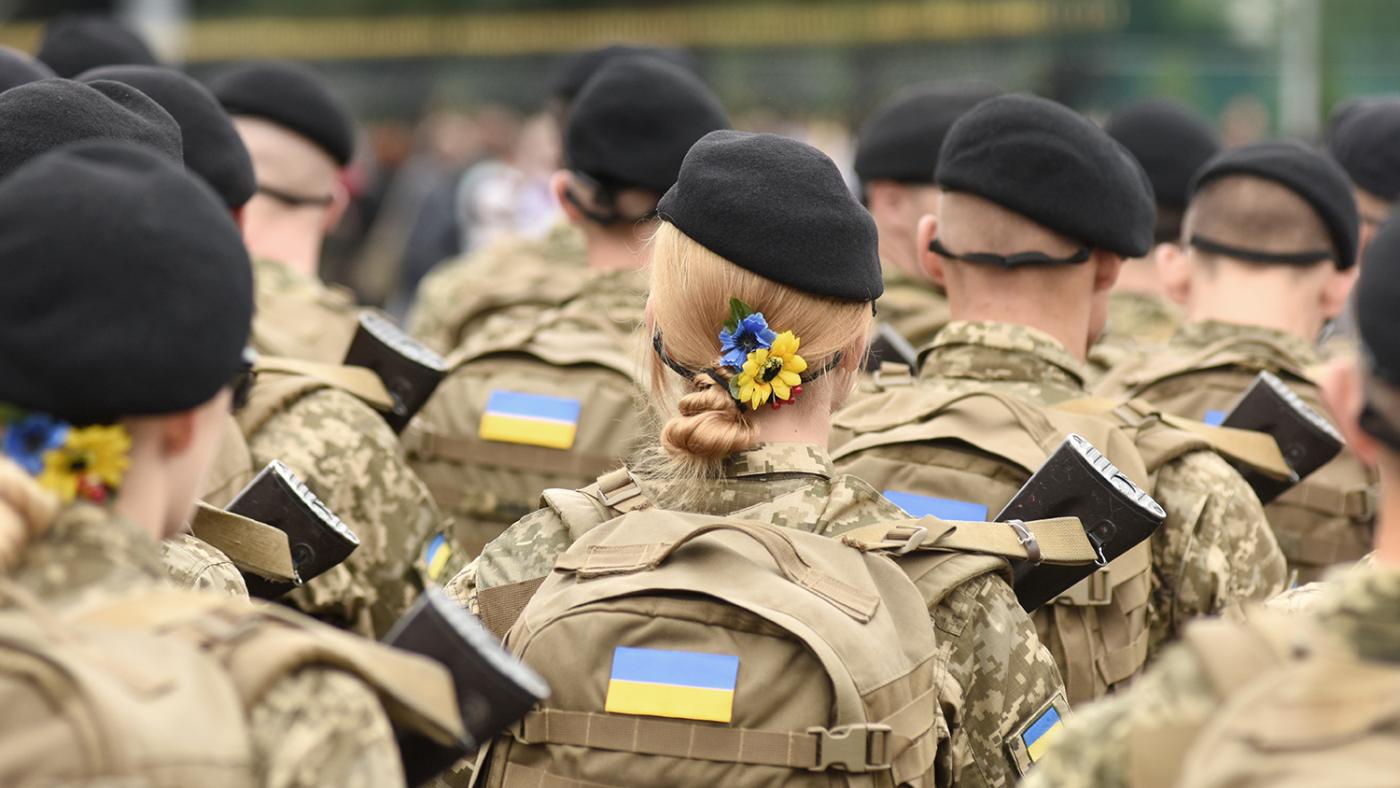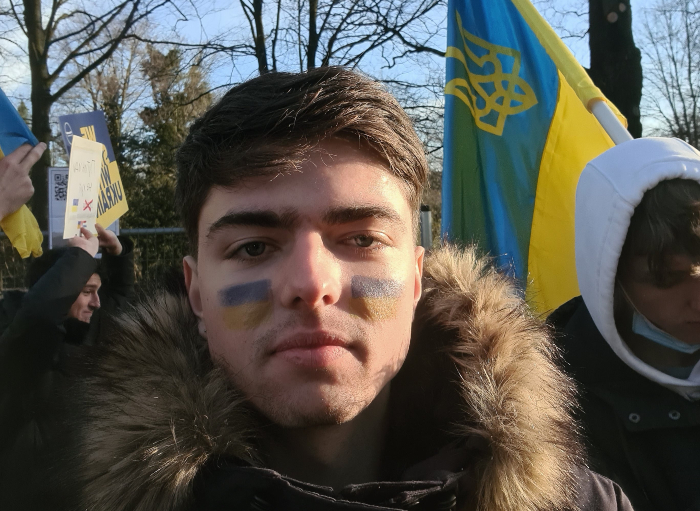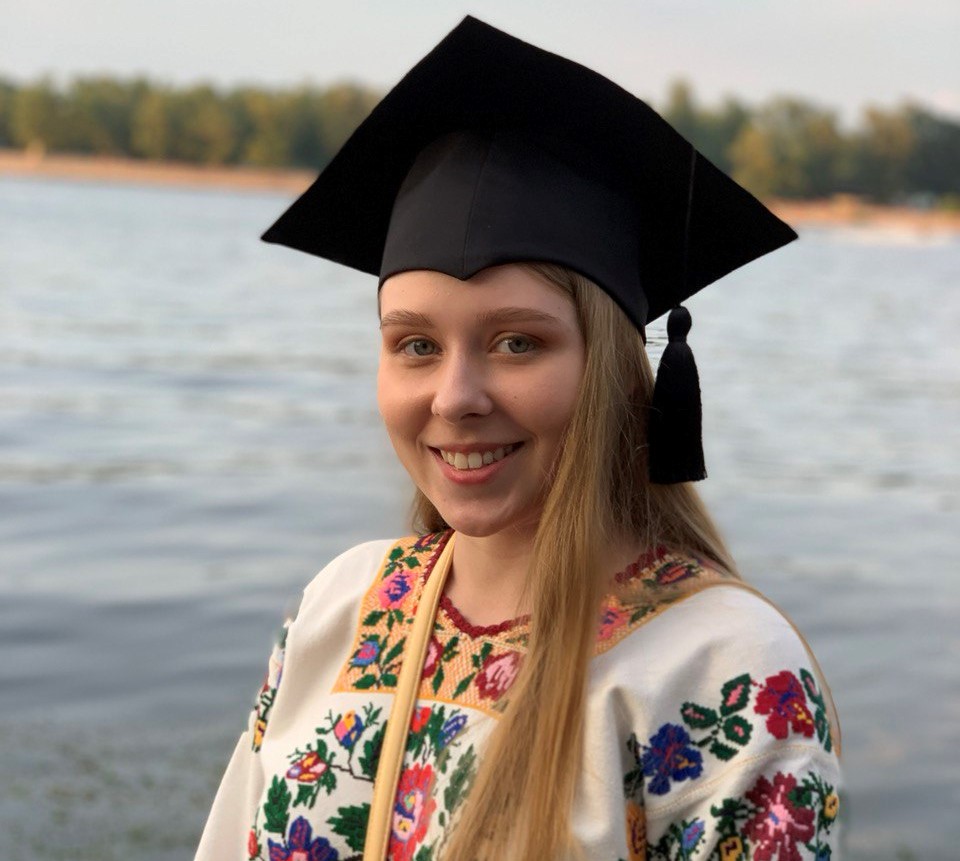'It’s sad that there are no protests planned in Utrecht', say Ukrainian students

According to UU, there are twelve students and about ten scientists from Ukraine at the university, but that number may be higher, as some people may have double nationality or be naturalised Dutch.
This week, the university invited them for a meeting to listen to their concerns. Two students turned up: Andriy Ostryagin, a first-year student in the Philosophy, Politics and Economics Bachelor’s, and Anna-Maria Sukhar, who is in the second year of her Master’s in Sociology and Social Research. DUB spoke with Andriy, Anna-Maria and Lisa Bashcheva, who’s pursuing a one-year Master’s in Gender studies.
Andriy has been living in the Netherlands for almost nine years with his mother. Most of his family lives in Eastern Ukraine. Anna-Maria is from the Western part of the country but moved to Kyiv for her Bachelor’s, where she met Lisa. She was planning on going back to the Ukrainian capital to work for the government or an NGO. Lisa wanted to stay in the Netherlands for a couple more years, to get work experience and maybe do a PhD.
How did you feel when the war broke out? Were you surprised by the news?
Andriy - “I was in a state of disbelief and actually still am. The military buildup was happening for quite some time, and the US and Europe were saying an invasion was likely, but it just didn’t make sense to me. When I saw the news, logically I understood what was happening, but it still felt surreal. Talking to my grandparents and friends made it more real to me. I talked to a friend on the phone and I could hear explosions in the background. Knowing that people I really care about are experiencing this is horrible”.
Lisa – “One week before the war started, my mother brought my 12-year old sister to stay with me for a while. We expected something to happen, but I guess none of us ever imagined something of this magnitude”.
Anna-Maria – “I was worried but not expecting such a rapid, full-scale invasion. But now, looking back, there was some tension in the air. Two months ago, when travelling with Lisa back to Ukraine for the Christmas holidays, there were already some scary articles in the press, but it all seemed so far away. None of us believed this could happen”.
 Lisa Bashcheva with her little sister.
Lisa Bashcheva with her little sister.
Where is your family right now?
Andriy - “Most of my family lives in Dnipro, a city in Eastern Ukraine. I’m not worried about my grandparents because they live in a village, so they’re probably out of harm’s way”.
Anna-Maria – “My family is still in Lviv, in what is the safest part of the country now. Yesterday my mom didn’t pick up the phone the whole day, and I was so stressed out. My father was also on duty for his territorial defence group, so it was not an easy day for me. There is no fighting going on in my city, but this group is working to prevent sabotage. My family is not planning on leaving the country”.
Lisa – “My family is staying in our holiday home in the countryside, with some close friends. Because the attackers are trying to take over Kyiv, they have no electricity or heating. My mom texted me yesterday morning but has been offline ever since. I hope it’s only a problem with the telephone connection. It is hard for them to evacuate that house because it’s dangerous to go outside. The aggressors are attacking civilians’ cars when they go out. Basically, they are trapped in that house.
My sister, who is here with me, doesn’t fully acknowledge what is happening. She keeps on telling me she will soon get home, or that we should buy this and that. She’s not aware that our apartment might not exist anymore and there is no home”.
Have you been following the news about the war or is it too much for you?
Andriy - “I try to follow the main news outlets and some Telegram channels. A lot of them are trustworthy and they are more up to date than the NOS and other big news sites. But that’s both good and bad, as I’m also exposed to images of atrocities from all angles”.
Anna-Maria – “I don’t follow any Dutch or international news outlets. Only Ukrainian ones. I already have notifications popping up every 5 minutes on my phone, so I don’t think the international ones would inform me anything I’m not familiar with”.
Lisa – “I also prefer to read the same sources my family is reading. Sometimes I talk about a piece of news with my friends from UU and they are not aware of it. It was big news in Ukraine that the Russians attacked kindergartens and orphanages, for example. We should acknowledge that war is not only physical, it is also a battle of information and propaganda”.
Do you feel supported by your fellow students?
Andriy – “Definitely! Many of my classmates messaged me and came out to protest. A group of PPE students also organised a protest in front of the Russian embassy, and many are actively collecting supplies to be sent to Ukraine. Another student is on her way to the Ukrainian border to volunteer”.
Lisa – “In my studies, they are really supportive. Many messaged me to say they care. I really appreciate it. I also appreciate the gesture of reducing the workload for us. My internship supervisor understands that I’m not in the best mental state to be productive right now”.
Anna-Maria – “To me, it’s important to receive support, but I suppose for others it might be too much to have everybody asking how you’re doing all the time. At the same time, I understand that it would be weird if people acted like nothing is happening”.
Lisa - “It is hard for us to be here now, in a safe space, without any power to change things, while our loved ones are far away, suffering. This is an important point to understand when people are trying to support us. Yes, it is heartwarming that they ask how they can help, but sometimes I don’t know what to answer. This is the first time this is happening to all of us.”
Anna-Maria: “Exactly. I, too, struggle with the fact that I’m here, safe. And I feel guilty… Like it’s my fault”.
And what do you think UU could do to help?
Andriy - “It was nice that UU invited us to talk about our concerns. In the meeting, we said one of the ways the university could help would be by communicating more about humanitarian efforts like the ones taking supplies to the border. The university could also organise the storage and transportation of these donated items”.
 Andriy Ostryagin in one of the protests against the Russian invasion of Ukraine.
Andriy Ostryagin in one of the protests against the Russian invasion of Ukraine.
Did you participate in the protests here in the Netherlands?
Andriy - “I’ve been to four protests and I met more Ukrainians in four days than I had in nine years. I ended up finding a Ukrainian community I didn’t even know existed. This arose under the worst circumstances, but it helps. I’ve never felt more Ukrainian than now”.
Anna-Maria - “Lisa and I went to the one in Amsterdam and we even did a speech. I’ve also been to the one in The Hague. But Utrecht is very silent and that breaks my heart because there are a lot of students here. In Ukraine, students tend to be more politically active. Every revolution starts with students”.
Lisa - “I can’t make people care more, but it made me uncomfortable to see people discussing their next protest at the end of the demonstration in Amsterdam. They were making plans for international women’s day. Like it was just another protest. And this is different, people are dying. It’s sad that there are no protests planned in Utrecht, while a few months ago, Utrecht students protested against the coronavirus measures”.
Anna-Maria: “It is strange that students are progressive, but they seem to care more about parties and bars than people dying in our homeland”.
What do you think about all the civilians volunteering to fight against the Russians?
Andriy - “On the one hand, it means the war will be prolonged and more bloody. On the other hand, if people weren’t willing to sacrifice themselves for their country, Ukraine would have been conquered by now. It looks like morale among Russian soldiers is getting low, whereas Ukrainians are just coming together, no matter if you’re a Russian speaker or Ukrainian speaker. That makes me think that, even if Putin does conquer Kyiv and install a puppet state, he will never be able to hold the country. Conquering a country and holding on to it are two different things. There is always going to be resistance from the people. I see this as his slow fall from power, and the fall of Russia as a world power”.
Anna-Maria - “We’ve always known how strong we are. But, this time, we are proving it. I am so, so proud of our army and our people.”
Many Ukrainians have families in Russia and vice-versa. How does that make you feel?
Andriy - "It is heartbreaking. I’m half Russian myself, from my dad’s side. Russia uses this in their propaganda, saying they’re invading the country to save a brotherly nation. But what Putin is doing is ripping those ties apart, making us kill each other and poisoning the people with his propaganda, saying we’re neo-Nazis, which is so absurd”.
Lisa – “My father is Russian, too, and so are the friends my parents are staying with at our holiday home. But they are all full of hatred for Putin and the Russian aggression”.
Anna-Maria - “It should be noted that many Ukrainians speak Russian because of historical reasons”.
Andriy - “The Russian language was enforced in the East during USSR times. But I feel like the war is changing that. This situation awoke a sense of national identity. I never felt as though I was less Ukrainian for speaking Russian, but now I’m making a point of speaking Ukrainian at the protests because it feels like I’d be standing with Russia otherwise. It’s sad that Putin is weaponising language like that”.
Anna-Maria - “Yesterday I messaged a Russian-speaking friend of mine and she answered in Ukrainian”.
 Anna-Maria Sukhar on her graduation day in Kyiv. She is wearing a traditional Ukrainian shirt.
Anna-Maria Sukhar on her graduation day in Kyiv. She is wearing a traditional Ukrainian shirt.
What is your view on the protests that happened in Russia? Many have noted that it is dangerous for Russians to protest against the war.
Andriy - “I both agree and disagree with that statement. Until 2014, Ukrainians had a pro-Russian government that put a lot of repressive laws into place, and that only made Ukrainians fight harder for their freedom. Even now, I’ve seen a lot of videos of entire villages coming together and protesting in front of tanks. You can’t use fear of imprisonment as an excuse not to speak out, as staying quiet is supporting the regime as well”.
Anna-Maria: “I understand it is risky to protest in Russia, but if hundreds of thousands go out to protest, it is impossible to arrest everybody. If only a few thousand go, it’s easier.”
Lisa: “It’s hard to know exactly what is happening there because it is a dictatorship and they don’t get objective news, if such a thing even exists”.
Other than sanctions, what do you think other countries could do to help?
Andriy - “I think NATO should turn Ukraine into a no-fly zone, which means they would assist in shooting down Russian missiles”.
Anna-Maria - “These harsh sanctions are a huge step, but I feel like the international community could do more. Yesterday, Lisa and I read that the UN General Assembly voted overwhelmingly for the withdrawal of Russian troops. Uhm, okay… Thanks, I guess.”
At this moment, Anna-Maria's answer is interrupted by the sound of a plane or helicopter flying outside.
“This is so scary right now. During the protest in Amsterdam, helicopters were flying above us, and that sound scared me”.
Lisa - “I would be happy if Ukraine would be part of the EU because my little sister is here and I don’t want her to be a refugee. I don’t know why it bothers me that much, but I feel like our lives are already so ruined and this status would be a crown on top of it all”.
What do you think is going to happen?
Andriy - “I’m optimistic that Ukraine is going to hold up. Russian personnel seems to be kind of exhausted. But it’s such an unpredictable situation I really cannot say”.
Anna-Maria - “I just hope that peace will return to our country. Just f*ck off, go away. We’ll never give up our country. Ukrainians would rather die than accept Putin and his regime.”
Lisa – “I just want it to stop. Our lives are ruined already. It’s only been a week, yet it feels like a year. This takes a lot of energy, not to mention a lot of resources and lives. Even if they get the soil, they’re not getting our support. We’re going to live with this hatred, we won’t forget”.